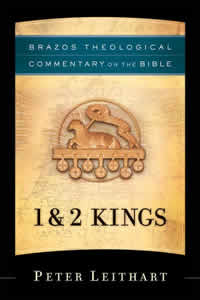Book Notes
 Peter Leithart, 1&2 Kings; Brazos Theological Commentary on the Bible (Grand Rapids: Brazos Press, 2006), 304pp.
Peter Leithart, 1&2 Kings; Brazos Theological Commentary on the Bible (Grand Rapids: Brazos Press, 2006), 304pp.
Peter Leithart's study of 1 & 2 Kings is the third installment in Brazos's projected forty-volume series of theological commentaries on the Bible. Jaroslav Pelikan led the series with a masterful study of the book of Acts (2005), Matthew Levering explored Ezra and Nehemiah (2007), and Stanley Hauerwas of Duke University tackled the gospel of Matthew (2007). With a PhD from Cambridge and extensive pastoral experience at Trinity Reformed Church in Idaho, Leithart made me feel like I was enjoying the best of academic scholarship, linguistic analysis, literary insights, historical reflections, and thoughtful applications to contemporary Christian discipleship.
1 & 2 Kings begins with Solomon's ascension to power and ends with Judah's banishment to Babylon, which means that Leithart makes a panoramic sweep of roughly 400 years of salvation history in Israel. For him this story of the politics of God and the politics of humanity is not merely historical, prophetic, or sapiental (as a type of wisdom literature), which it is, but rather and especially it is a "gospel text" that has practical applications to our ecclesial experiences today. There is the inseparable interplay between a king's private life and his public office. Idolatry, of course, looms large in these stories, especially the "guns, gold, and girls" of Solomon. The partition of Israel and Judah is redolent with applications for post-Reformation divisions in the church and the nature of genuine ecumenicity. There's the prominent role of "outsiders" like the Gentile Naaman among the "insider" elect Israel. The providence of God over the history of humanity is a major theme in this "court history" of Israel's kings.
Guiding Leithart's interpretation of Israel's history is his strongly and unapologetically Reformed doctrine of God. Yahweh is no "great marshmallow in the sky. He is not a God who plays softball. Nor is he the god of the philosophers, a gorgeous but impotent force in heaven. He is a warrior who fights to win, and deception is part of his art of holy war" (164). He is a God, says Leithart, of enmity and enemies (146–151), of violence and vengeance (157), and not merely by way of accommodation to human sinfulness or passive permission in the divine will. In contrast to Wink, Leithart endorses violence as not only a necessary evil but as a "redemptive" and "positive good" (41). He wants to avoid any "Marcionite" (or Anabaptist) tendency toward a discontinuity between the Old and New Testaments that would privilege the Jesus story over the gore of 1 & 2 Kings. He repeatedly insists that God is not arbitrary but instead a God of boundless love and grace. I found this combination a hard sell, and I suspect that other readers might too. Why not read 1 & 2 Kings as understandably and necessarily primitive stories? Why elevate historical description to theological prescription? In the end, in Leithart's interpretation Yahweh is a "boundary-transgressing" (131) God of surprises in more ways than one.


